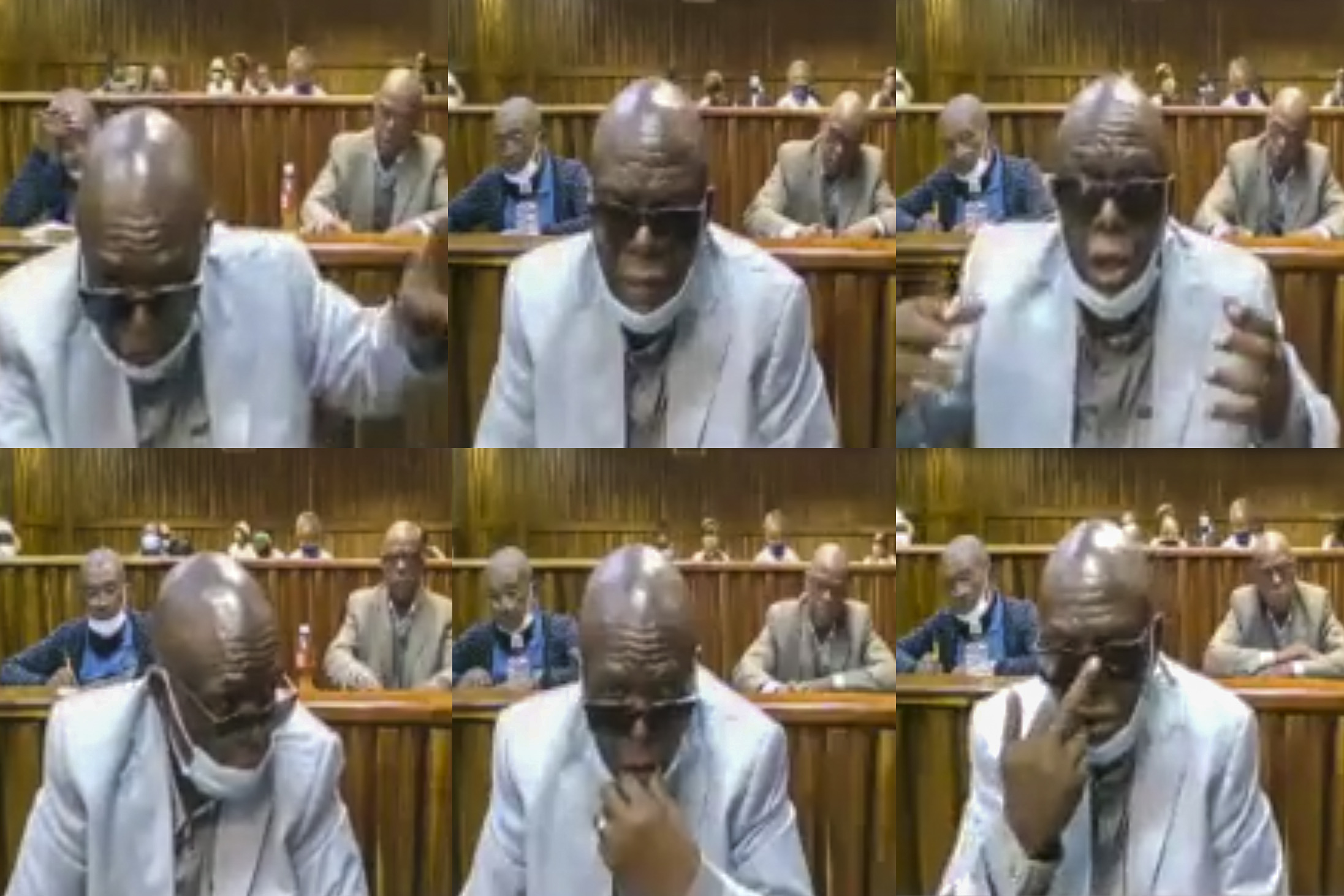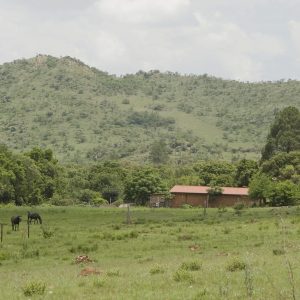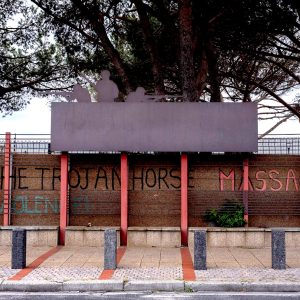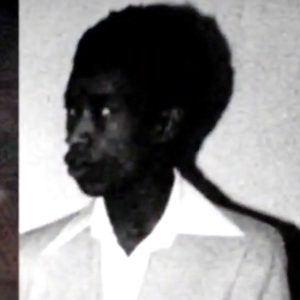The officers who allegedly killed Ernest Dipale
Former askari Joe Mamsela has revealed who he says killed Dipale in 1982 while the young activist was detained at John Vorster Square police station.
Author:
10 March 2021

“The revolution is bloody, the revolution is hostile, the revolution overturns everything that gets in its way,” said former apartheid askari Joseph Mamasela during his testimony on Wednesday 3 March at the reopened inquest into the death of Ernest Moabi Dipale.
After seemingly making great efforts to dodge the police officers who had been trying to serve him with a subpoena to testify, Mamasela finally made his appearance to tell Judge MA Makume what he knew about the life and death of Dipale. The young activist was found hanged in his cell at John Vorster Square police station in the early hours of 8 August 1982.
Mamasela wore dark glasses throughout the day-long session and became angrily defensive at times. He was adamant he had “nothing to hide” and that he had come forward of his own volition.
“Closure, especially for the mother of Moabi. I’m doing it for her and not for ANC killers who buried people in shallow graves and then make themselves feel better by calling us askaris … when they were like dogs eating their own puppies. I’m not ingratiating myself with the ANC, I’ve got nothing to do with pleasing the ANC. I’m here to try and rebuild the country. I’m here to try and give the community closure. I’m not begging for my life.”
Mamasela denied any involvement in the kidnapping and assault of Dipale in October 1981, for which fellow Vlakplaas operative Almond Nofomela applied for amnesty to the Truth and Reconciliation Commission (TRC), although he is implicated by Nofomela’s TRC and recent testimony before the Dipale inquest.
Related article:
He also denied that – despite testimony to the contrary by former Security Branch officer Nicolaas Deetlefs – he fired four shots from a police vehicle at Dipale and passenger Oupa Koapeng while in pursuit of them in Soweto. This was on the evening of 4 August 1982, the day before the Security Branch arrested Dipale.
Mamasela also claimed that he had not shot Dipale’s sister Joyce in the neck during a raid on her Botswana home in November 1981. This despite evidence presented to the TRC by his former Vlakplaas commander, Dirk Coetzee, and Nofomela. Recalling the events of that night to Makume, Mamasela said Coetzee had run into the house with an Uzi submachine gun and begun to spray bullets wildly, injuring Joyce, whom Mamasela then saw bloodied and attempting to crawl to safety.
He said he could have killed her to protect his identity as an askari and although he wanted to pull the trigger as he pointed his gun at the badly injured woman on the floor, “my conscience acted against me … You can’t kill an unarmed woman like that. So that’s how I left Joyce Dipale … [She was] a Christian … and she had a Christian heart.”
Mamasela said during the lunch break that he had made peace with Joyce and other members of the Dipale family, and told the inquest that he wanted to “apologise profusely to the members of the Dipale family. I want to build a new South Africa and only through telling the truth can we build a new South Africa … I took part in the raid on Joyce Dipale. I took part in the arrest of Ernest Dipale who ultimately was killed. A reasonable man, a conscious man, [I] must apologise and do the right thing by coming out like I’m doing now to get closure for the family.”
No other choice
Mamasela was born in Soweto on 2 June 1953. His parents were labourers and not politically active, but the young Mamasela soon became involved in student politics in the 1970s while at Morris Isaacson High School. He served as an executive of the South African Students Movement and was involved in the Soweto protests in 1976. Mamasela left school and fled into exile in Botswana, where he joined the ANC in 1977 and received military training.
Mamasela has also claimed, before the TRC and at the Dipale inquest, that his political involvement was also motivated by the death of his uncle Ernest, whom the Security Branch killed in 1977. “I never wanted to kill anybody for that. Nobody talks about that. They talk about Mamasela this, Mamasela that,” he said at the opening of his testimony at the Dipale inquest.

It was while in Botswana that he met his former Morris Isaacson schoolmate Roller Masinga, who was working for the ANC, and his wife Joyce Dipale. According to the version of events he told journalist Jacques Pauw, Mamasela was arrested by members of the South African Security Branch in 1979 and brutally interrogated using methods that included electric shocks and beatings. However, Pauw has suggested that while Mamasela claimed his arrest was the result of his political activities, “there is evidence to suggest that he was involved in common crime and that was the real reason for his detention and interrogation. A charge of armed robbery had been opened against him in Randfontein … but according to police reports, charges were withdrawn.”
Mamasela told the Dipale inquest he endured 72 hours of torture and eventually co-operated because he had no other choice. When the ANC discovered his identity as an informer in 1981, members of the movement, including Masinga, kidnapped Mamasela and his half-brother. Mamasela told Pauw that his half-brother “was innocent, his mere crime being that he was at the wrong place at the wrong time. They murdered him that same evening, shot him and burned his body.”
Mamasela told the inquiry that it was while transporting the charred corpse of his half-brother – whom he had only been able to identify by a ring on his finger – back to South Africa that he was stopped by the Security Branch, who recruited him as a fulltime askari, using his anger towards the ANC to finally convince him. Almond Nofomela told the Dipale inquest that Mamasela’s dedication to avenging his half-brother led him to wage a personal war against the Dipale family, but Mamasela has denied this.
‘A born killer’
Mamasela was involved in the murders of at least 40 anti-apartheid activists during his 12 years as an askari, many of them committed while he was based at the notorious Vlakplaas and later as part of a death squad that operated out of the Northern Transvaal Security Branch. Coetzee told Pauw that Mamasela was “ruthless and had the killer instinct”, and that he was “a born killer”. Coetzee added that while Mamasela had been forced into killing by his new masters, “he never objected and was always willing to do the job. He was an outstanding criminal and a cruel man … He hated the ANC as much as we did. He was waging his own war against them.”
A former death squad colleague, Warrant Officer Paul van Vuuren, similarly told Pauw: “Mamasela and I were more bloodthirsty and enjoyed our work. Mamasela shared our sentiments about the ANC. He hated the ANC and was taking revenge for the necklacing of his brother.”
Related article:
By the time he turned state witness against Eugene De Kock and other members of the apartheid death squads in 1994, Mamasela had spent much of his life as what he described as a “political serial killer”. When National Prosecuting Authority advocate Jabulani Mlotshwa asked him at the inquest why he had waited so long to make amends to the Dipale family, Mamasela replied, “I didn’t wait this long. There was no platform I could use to apologise to them. I went to the TRC, they never went there. I went all over the country disclosing, they never went there. Now they are here and I’m grabbing this opportunity and instead of praising me, you are attacking me.”
While it is true that Mamasela gave many hours of evidence before the TRC, he did this behind closed doors where he did not have to face the families of his victims. He also only gave evidence after he had secured a deal with the office of the then Transvaal attorney general that indemnified him against prosecution in exchange for evidence against his former commanders. Mamasela told the TRC that he saw himself as a victim of apartheid who had little choice but to co-operate, and as such he refused to apply for amnesty for any of his crimes.
In his 1997 book Into the Heart of Darkness, Pauw wrote, “I have spent many hours with Joe Mamasela, and never have I detected a shred of remorse for anything he has done. He spoke of ways of making money and would talk about the ANC as ‘stupid k*****s’ who ‘don’t have a chance in hell’ of ever getting at him.”
Reborn as a preacher
Mamasela has remained largely out of the spotlight for the past 15 years, except for a case in 2011 in which he was tried and acquitted for the murder of his Soweto landlord after an altercation about a house he was renting. He is a self-proclaimed reborn Christian and preacher who works in security.
Although Mamasela flatly denied any involvement in the kidnapping of Dipale, Mlotshwa did not push him too hard to respond to Nofomela’s evidence in this regard. Neither did Mlotshwa question him too extensively on his contradictory version of Dipale’s pursuit and eventual arrest.
Mamasela had nothing but disdain and scorn for Nofomela, whom he derided as a fool and a high-school dropout. He told Makume that Nofomela “lied about killing the farmer who raised him up as his own child and he killed that farmer for his money. He went to the gallows and now he lies again. When is he going to reform and become a brand new South African?” Nofomela is “a liar and you must scrutinise his evidence. Me? I’ve got nothing to lose. You can scrutinise me, you can sentence me, I don’t care. I’m just telling the truth,” added Mamasela.
Related article:
He told the inquest that Deetlefs had “lied through his white teeth” about his involvement in the Dipale matter and made a potentially explosive revelation, for which it seems the inquest will not call Deetlefs to answer.
The statement maker
Mamasela said that on 8 August, after the death of Dipale was reported, Deetlefs and fellow Security Branch officer Cecil Smith came to Vlakplaas to see Coetzee. “I was there and they were talking and they had a photo of Moabi Dipale hanging from the window. It was a colour photo. He was wearing a striped jersey and his head was hanging to the side and there was blood oozing from his mouth,” Mamasela said. Deetlefs and Smit “wanted advice because they said they must write a statement, how did he die? And they were worried about that.”
Mamasela described Coetzee as “a mastermind” and said this was why the two officers had come to Vlakplaas for advice. “He could think. He’s the one who made statements. Even for myself at the Harms Commission, he’s the one who made my statement.”
Mamasela testified that Deetlefs and Smit “were scared. They were telling the truth. They said, ‘We beat him and then the next thing he was dead. So we had to hang him on the wall.’ [Deetlefs] said that his commander was very angry with him and that he said, ‘If you killed this boy, you must start running. You must pack your bags and start running.’”

Mamasela said Coetzee told Deetlefs and Smit to write a statement saying “that as he [Dipale] swung around, he beat the wall and then he bit his mouth.” There is no record of such a statement in the evidence submitted before the reopened inquest.
The photos submitted into evidence from the security police file on Dipale show the young man hanging from a window in his cell, wearing only his underwear. However, Mamasela was adamant that “I saw this thing almost 30 years ago and it got stuck in my mind. That’s why I can still describe that photo.”
He added that in his recollection of the photograph, Dipale was shown hanging lifeless from the window, wearing a jersey with stripes and what Mamasela described as “Bermuda shorts”. When pressed by Makume as to what had happened to the photograph, Mamasela said Deetlefs and Smit had taken it with them when they left Vlakplaas.
‘We were gods’
Mamasela said he and the other Security Branch officers “were a law unto our own selves. We were gods.” This would explain why, according to Mamasela’s version of what happened to Dipale, it would have been easy for Deetlefs and others to make their way freely into the cells at John Vorster Square – without interference from members of the uniformed police who were stationed there – to stage Dipale’s hanging.
Related article:
“A uniform police officer, when he sees a Security Branch officer, he sees his God,” said Mamsela. “You send him away. ‘Vokof, gaan koop vir my ’n koeldrank (Fuck off, go and buy me a cooldrink)’ He runs and they do their thing. He comes back, he’s happy. The boss gave him R2, he’s happy.”
As he prepared to stand down, Mamasela made sure to remind Makume that “I came out on my own volition because I wanted to start a new life, and as you can see I’m living life to the full. I don’t have a guilty conscience anymore.”
With that, the man once dubbed The Good Soldier Joe returned to the shadows, leaving a trail of difficult-to-test allegations and vehement denials in his wake, and bringing the reopened inquest to a close. It is an inquest that has left Dipale’s family hoping for a reversal of the original finding of his death as a suicide, if not much closer to the truth of what really happened to him and why.




